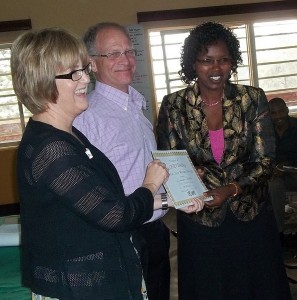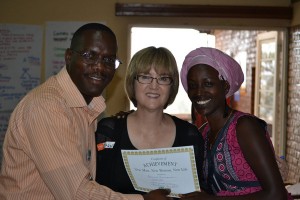From our website, our primary purpose at Empower reads:
We seek to emulate the early Christian church in proclaiming God’s love for us and its meaning for our relationships with each other; in raising the respect, freedoms, and rights accorded women; in freeing men from norms of worldly masculinity that lead to violence and despair; in encouraging equal-regard marriage and family happiness; and in helping to create and develop community values that eliminate sexual, ethnic, and other social antagonisms.

This past July, Sarah and I worked jointly with International Justice Mission (IJM) to facilitate Empower programs in Rwanda and Uganda. Our audiences were clergy and church leaders from many denominations.
In Amos, it is written:
Seek good, and not evil, that you may live; and so the LORD, the God of hosts will be with you, as you have said. Hate evil, and love good, and establish justice in the gateRwanda always unnerves me. It is a place of recent unspeakable horrors. Even our meeting room at the Scripture Union in Kigali bears silent but visual witness to brutality as there were numerous bullet holes left in the windows even eighteen years since the genocide. It is socially and legally forbidden to discuss tribal designations for fear that such discussion could re-open wounds.
Our seminar in Kigali was comprised of survivors from the genocide. Some had lost their entire families. One had raised the children of her murdered siblings. Another was forced to flee to Burundi and work as an indentured servant. A husband was estranged from his wife for eighteen years as they were of different tribes. Some may have been aligned with the perpetrators but all were victims of the Rwandan history. All had similar stories. This was our group.

For most of the first day, they sat patiently, quietly, and politely stonewalled. I whispered to IJM’s Abraham George that this was unusual behavior. Normally, the participants were locked in loud energetic discussions of the pressures and expectations that were placed on men and women.
No. These folks were silent or were only providing bland politically correct answers. It felt like that we were not going to be able to convey our message of one flesh and that we would have to just muscle our way through the material. Only later would I put all of these dynamics together in my head. These people had lived through hell and had been on both sides of the genocide. Of course they would be extremely guarded in their comments.
If there was ever a place that yearns for justice, it is Rwanda. It is also a place that yearns for love and forgiveness.
Why, might one think, is a proper biblical view of men and women and marriage relevant to this situation? And, what does this have to do with justice?
The first three books of Genesis contain the message of the entire Bible: the way it was intended at Creation and then what happened at the Fall of Man. Sarah developed a lens from this for understanding all of scripture while traveling this summer in Africa: Genesis 1 and 2 (the way Creation is supposed to be) and Genesis 3 (the way the world is). This lens proved to be very useful.
The social dynamic of man striving with man to always gain the big man or patriarchal status helped to explain so many of the wrongs that these people were facing. When Jesus states in Matthew that it was not so in the beginning, that a man shall leave his father and mother and cleave to his wife and that the two shall become one flesh, was a great blessing to them.
Over the course of the three days that we were in Kigali conducting our seminar, our discussions went from the highly guarded comments to practical ways that they could live even though these ways would depart from the cultural norms. The Bible was showing these men and women that they were intended to live and work alongside each other with no gender differentiation in tasks and better yet, they were to be one flesh.

The man who had been estranged from his wife stated that it was now important to reconcile with her even though his culture — and his pastoral colleagues — were telling him otherwise. This is the good news and little by little, it is transforming hearts and societies. As a man treats his wife with dignity and love, his children will see a new and better world – a Genesis 1 and 2 world.
The Bible encourages all of us to hate evil and love good and to establish justice in the gates. Interestingly, if one hates evil and loves good, then justice in the gates will be the product of this transformed heart.
Is there hope for Rwanda? Can the government there, along with all of the aid from nations around the world, enforce justice? Left to these governing bodies alone for justice and forgiveness would be a tough wager. But I contend that it is good to hope for great things for this amazing country because hearts are being transformed. Pray with us for Rwanda that it can be the miracle of Africa. Pray for forgiveness and the softening of hearts. Pray for the men and women of the Church to love and respect one another. If Rwanda, a place with profound hurt can be transformed, then perhaps, Kenya, with all of its pain and history can be as well. And where then, Lord?
David Nutter
